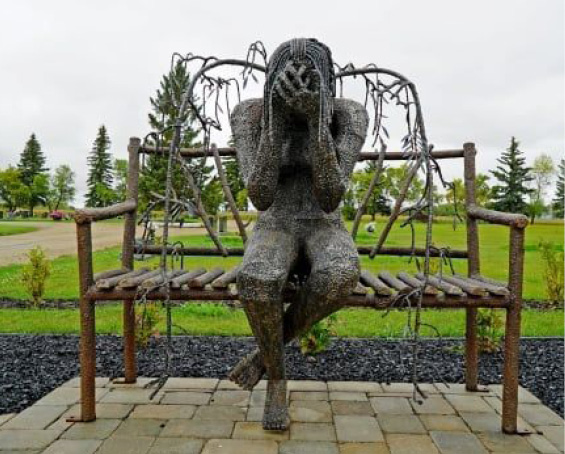-
Understanding Grief ›
-
- Truths about grief
- What grief looks and feels like
- Common challenges with grief
- Grieving before the loss
- Ideas for living with loss
- Grief triggers
- How long grief lasts
- How the loss affects families and others
- When life starts to get better
- Special dates
- Rituals, funerals, and memorials
- Do I need more help?
- Prolonged grief
-
-
Grieving a Death ›
-
Non-death Loss ›
-
Supporting Someone ›
-
Professionals & Volunteers ›
-
Resources & More ›
Grief after a traumatic death
Some deaths are traumatic for the people left behind. This could be because the death was violent or unexpected, or because you witnessed the person in pain or distress before they died, or even felt unsafe yourself, depending on the situation. How we respond to loss and death is dependent on many factors, and not everyone will respond to the same loss in the same way.
“I wanted to talk about what had happened, but I felt ashamed, and I didn’t want to expose others to what I had seen and heard.”
When might a death be considered traumatic?
A traumatic death is usually sudden, unexpected, and highly distressing. The loss can overwhelm someone’s ability to cope. For example:
- An untimely death (e.g., death of a child or youth)
- An unexpected death (e.g., pregnancy loss or miscarriage, suicide, accident, heart attack)
- A death that is considered preventable (e.g., a medical error)
- A death that involves great suffering (e.g., unmanaged pain, abuse)
- A random death (e.g., natural disaster, war)
- A violent death (e.g., murder, mass killing, terrorism)
- An unnatural death (e.g., poisoning or overdose)
- A death caused by another person with or without intent to harm (e.g., shooting, car accident)
- A death regarded as unfair or unjust (e.g., police shooting of an unarmed person)
- A public disaster with many casualties (e.g., car or plane crash, fire)
Contributing events or circumstances
Sometimes the circumstances around a death may result in trauma. For example:
- Finding the body of the person who died
- Returning home to find medical equipment, police, or blood
- Witnessing disturbing sights, sounds, or actions during a death
- Hearing or seeing alarming actions by healthcare providers or others
- Receiving information that is upsetting or insensitive
- Feeling that your life was in danger at or after the time of the person’s death
Complicating factors
Other factors related to the death may increase the impact of the loss. These include:
- How you received the news
- Lack of information
- Surviving or witnessing an event where someone died
- Identifying the body
- Not being able to view the body or the body not being recovered
- The criminal justice system or media
- Lack of support
Signs of trauma
Not everyone who experiences a traumatic death will be traumatized. Being able to recognize the signs of trauma is important so that you can find help if you need it. Signs include:
- Re-experiencing or imagining the traumatic event
- Not being able to remember the details of the event
- Avoiding thoughts or reminders of the traumatic incident
- Negative changes in thinking or mood
- Increase in “anxious arousal” or feeling “on edge”
Impacts of trauma
If you previously saw the world as a safe, just, or fair place, your views may have been deeply challenged by this death. You may feel afraid and unsafe in the world, and you may spend a lot of energy avoiding threatening or painful reminders.
- It may help to acknowledge that your world has been shaken.
- Try to be kind to yourself as you give yourself time to grieve.
- You may find it helpful to gently allow yourself to consider that there may be some questions with no answers.
- It may help to ask a trusted friend or family member to accompany and support you.
- You might want to seek help from a therapist who is experienced in trauma and grief. You may need to work with the trauma before you can begin to grieve, or you may need to go back and forth between the two.
When someone is experiencing trauma and grief, they may be reluctant to share their experience with others for fear of traumatizing the listener. They may be feeling a sense of guilt or shame. To provide support it is important that you are willing and able to hear their story, without judgement, criticism, or advice.
You might encourage and help them to seek support from a professional counsellor experienced in grief and trauma.
If you feel overwhelmed or “stuck” please talk to a health professional or trusted leader in your community such as a doctor, chaplain, nurse practitioner, social worker or school administrator. These trusted people may be able to connect you with appropriate programs, resources, and other forms of needed support such as grief counselling or medical care. You may be able to access counselling services if you have an Extended Health Plan, or through an employee assistance program. It will be important that they have experience in grief counselling. If you have thoughts of or plans to harm yourself or others, go to your nearest Emergency Department, call your local Crisis Line, or call or text 9-8-8 if you are in Canada. It is essential that you reach out for help.
See also:
- Do I need more help?
- MyGrief.ca Module 8 - Do I need more help and where to find it
Traumatic experiences can shake your world and deeply challenge your beliefs. Try to remember that a trauma response is a normal reaction to an abnormal event. You may experience a loss of trust, confidence, or sense of control; a search for answers, meaning, or justice; and a sense of alienation or being set apart from other people. Ask for support from family, friends, and local or online resources. It may help to connect with a therapist who is experienced with trauma and grief.
See also:
- MyGrief.ca Module 25 - Grief after trauma
Video Gallery
Resources
Includes common grief reactions, reactions experienced after a traumatic death, coping with traumatic death, what to do if you need help, and when to seek professional help.
Includes guides for schools and practitioners. Provides a definition of traumatic bereavement, how it is different from other kinds of grief, if the circumstances of death lead to traumatic bereavemen ... Read more
Talks about the grief that accompanies expected and unexpected death and different ways we think about these events, and how we cope with them.
Murray Hidary describes how he turned to music to help understand and deal with the grief that came from witnessing the death of his sister.
Describes what traumatic loss is, symptoms of traumatic grief (including symptoms in children and teens), what happens to the brain after experiencing a traumatic experience, and possible intervention ... Read more
Thirty-one personal stories of trauma are shared in this book including the sudden loss of a child, surviving sexual assault, the legacy of residential schools, enduring war and imprisonment, and livi ... Read more
Describes what traumatic loss is, symptoms of traumatic grief (including symptoms in children and teens), what happens to the brain after experiencing a traumatic experience, and possible intervention ... Read more
Thirty-one personal stories of trauma are shared in this book including the sudden loss of a child, surviving sexual assault, the legacy of residential schools, enduring war and imprisonment, and livi ... Read more
Includes common grief reactions, reactions experienced after a traumatic death, coping with traumatic death, what to do if you need help, and when to seek professional help.
Murray Hidary describes how he turned to music to help understand and deal with the grief that came from witnessing the death of his sister.
Includes guides for schools and practitioners. Provides a definition of traumatic bereavement, how it is different from other kinds of grief, if the circumstances of death lead to traumatic bereavemen ... Read more
Talks about the grief that accompanies expected and unexpected death and different ways we think about these events, and how we cope with them.


